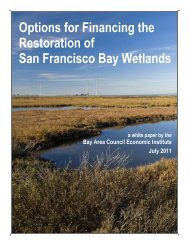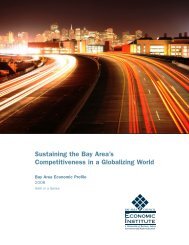PDF: 2962 pages, 5.2 MB - Bay Area Council Economic Institute
PDF: 2962 pages, 5.2 MB - Bay Area Council Economic Institute
PDF: 2962 pages, 5.2 MB - Bay Area Council Economic Institute
Create successful ePaper yourself
Turn your PDF publications into a flip-book with our unique Google optimized e-Paper software.
Global Reach<br />
With funding support from the U.S. Agency for international Development (USAID),<br />
Palo Alto-based nonprofit GeoHazards International (GHI) is working with the<br />
Delhi Public Works Department, Ministry of Home Affairs, and National Disaster<br />
Management Agency to assess and retrofit seismically vulnerable structures, focusing initially on<br />
five buildings: the Delhi Secretariat, Delhi police headquarters, Guru Tegh Bahadur Hospital,<br />
Ludlow Castle School and the Office of the Divisional Commissioner. It has brought facilities<br />
managers, structural engineers and liquefaction experts from the <strong>Bay</strong> <strong>Area</strong> to Delhi to analyze<br />
problems and has hosted Delhi Public Works engineers in Palo Alto for training. Once assessments<br />
are completed, USAID provides funding for retrofitting by locals.<br />
GHI has had an office in India since 2005, but first became involved in India in 2001, by invitation<br />
from USAID after two major quakes in the 1990s. Since then, the group has specialized in bringing<br />
the <strong>Bay</strong> <strong>Area</strong>’s experience and expertise in earthquake engineering to India. It raised funds from<br />
two NGOs—Volunteers for India Development and Empowerment (VIDE) and The NGOs<br />
Kobe (now Citizen’s Overseas Disaster Emergency or CODE)—to identify seismically unsafe<br />
school buildings in Ahmedabad, Baroda, and Surat. GHI and an Indian disaster preparedness<br />
organization, Sustainable Environment and Ecological Development Society (SEEDS), evaluated<br />
153 schools and made recommendations to authorities for reducing risk. It has assessed earthquake<br />
risk and proposed siting and construction solutions to local officials in Shimla City, a city of<br />
700,000 in the northwestern Himalayas, built in hillsides with slopes as steep as 70–80 degrees.<br />
San Francisco engineering firm URS Corp. is assisting the UK Department for International<br />
Development with resource planning and integration of government services delivery<br />
in Himachal Pradesh, where 91% of the population of 5.1 million lives in rural areas,<br />
relying mainly on the state’s forests for their livelihood. In March 2005, URS signed a memorandum<br />
of understanding with Tata Consulting Engineers (TCE) to pursue projects worldwide. The<br />
two firms also partnered, along with W. G. Yates–Desbuild Joint Venture, to build the $81 million<br />
U.S. Consulate complex in Mumbai, India.<br />
Privately held Bechtel Corp. of San Francisco came out of the Dabhol power plant<br />
litigation in 2005 (see Dabhol: The Mother of All Cases in the Legal Services section of this<br />
chapter) with $145 million in compensation and a positive reputation. Bechtel continued<br />
to advise the plant’s new operators after disposition of the case, and went on to bid in 2006<br />
on five new power plant projects favored by the Central Government.<br />
As early as 1990, Bechtel was working in India with metals and energy group Essar Global Ltd. on<br />
two projects: a $120 million plant to manufacture iron pellets for export to the Middle East and<br />
Southeast Asia, and a $700 million plant in eastern India to convert bauxite to alumina for export.<br />
The firm has had an ongoing relationship with Reliance Industries Ltd. (RIL), involving two<br />
large refinery projects in Jamnagar in 2000 and 2005. The first refinery began with a capacity of<br />
450,000 barrels per day, accounting for downstream activity totaling $26 billion in 2001—onesixth<br />
of India’s economy and one-third of its refining capacity that year. It eventually expanded<br />
capacity to 650,000 barrels per day. Continued expansion will produce a refinery complex the<br />
size of London that doubles capacity to 1.2 billion barrels per day, including clean fuels. The<br />
170








